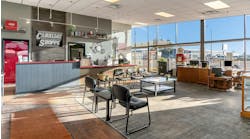Officially, Mike Caruso is retired. After 34 years of building Central Collision Centers into a six-shop staple of the greater Chicagoland area, the 57-year-old former FenderBender Award Winner sold his family business to Service King in a deal that closed Feb. 1.
“It was an incredibly hard decision,” Caruso says. “[The business] is my baby, the thing that I started at 23 years old. My kids are involved, my family’s involved, we have 92 people. If I was going to do this, it needed to be the best situation for everyone.”
Caruso’s business was still growing, having reached $19 million in total sales in 2014. Yet, he says, he didn’t see it continuing on that path on its own. Caruso spoke with FenderBender about the decision to sell, the process he went through, and what’s next for the “small MSO.”
What sparked the decision to seek a sale?
It’s interesting because we had a succession plan in place, and it was never going to be to sell to a consolidator. The plan was to turn it over to the kids, and then riding off into the sunset and having them send a check every month.
But we looked at the way the industry was changing, and that didn’t seem possible. We couldn’t stay the same if we were going to stay successful. To stay relevant in the insurers’ eyes, we needed greater size, and we needed to invest in newer technology—primarily being ready for aluminum repair.
We met regularly about it—myself; Nancy, my wife; my three kids; and my general manager who’s been here for more than 20 years. We started asking the question: Is this a business you could invest $15–20 million in to be able to get the footprint and aluminum capabilities to stay relevant? Was that a plan that would put my family and our team in a position to succeed long term?
We thought, if we can’t move forward, we need to look at some different options, like selling to a consolidator.
What was the process like selling the shop?
I’ve had offers to sell in the past, but this time, I was seeking it out. I looked at the Big 4, and really dug into what each had to offer. I looked back at their acquisition patterns and called, boy, must’ve been two dozen shops that had sold. And I talked to our insurance partners.
What stuck out to me about Service King was that they weren’t just buying dots on a map. They were picking up real top-level organizations—good, successful businesses that have a team behind them that will continue its growth path.
There were some big consolidators in the area, but Service King didn’t have a footprint yet. We would be their initial break-in to the market.
Overall, though, it was a long process. We first had contact with Service King in June 2014, and the sale just closed [Feb. 27]. There was a lot of due diligence involved. They looked at our financials, we went over items with their mergers and acquisitions team, they sent in Price Waterhouse Cooper for a thorough audit. After that, they made an offer and we went on to the purchase agreement.
Our deal was two-fold. There was an asset purchase, and then leases on the properties, because I still own all the properties personally. It was a cash deal, and I was pleasantly surprised that their offer was higher than our own valuations were. We announced it to our people on Feb. 10, and we closed Feb. 27.
One of the biggest parts of the deal for me was that our team would stay on in the same roles or better. We just have awesome people, and it was a real rollercoaster for me and my wife. Exciting but felt devastating at the same time. But we got assurances that our team would stay intact, and my children would remain in their roles.
What are the challenges for a smaller MSO to compete in today’s industry?
Well, there’s a distinction between stay relevant and compete. When I was talking about adding shops and being aluminum certified, that’s not about competing. That’s what we saw as the minimum to stay relevant to insurers. Let’s say you’re doing $40 million to $50 million in sales, can you really compete against someone doing $1 billion? No, you can’t.
That doesn’t mean that shops can’t be successful, but they’re always at that disadvantage. We’d already worked hard to sell ourselves as an alternative to the big consolidators, and we worked really hard for that. But there are clear advantages they have—a single point of contact for 50 or 100 stores; the scale to handle the predictive estimating that seems to be coming down the road; purchasing power for equipment and tools.
It’s getting more and more difficult, and shops can’t truly compete. You can stay relevant, though, and stay successful and grow.


